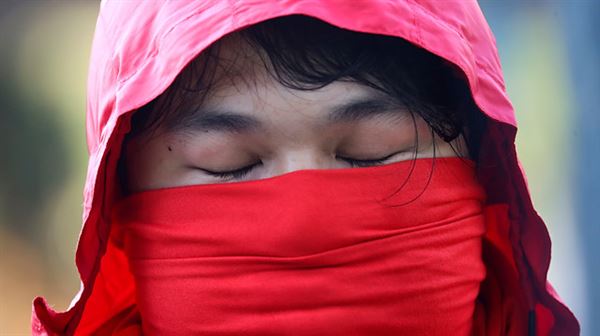Last week, the cafeteria of Hong Kong's Polytechnic University was buzzing with pro-democracy protesters who occupied the campus for days, fighting fi
Last week, the cafeteria of Hong Kong’s Polytechnic University was buzzing with pro-democracy protesters who occupied the campus for days, fighting fierce street battles with riot police in some of the most violent clashes during six months of unrest.
On Monday, a lone student sat at a long table, one of several dozen people believed to remain on the wrecked Kowloon peninsula campus in deteriorating conditions that have raised fears about their health.
“We have been trapped in this place for a long time,” said the man in his 20s, who asked to be identified only as Norym, clutching a cup of coffee from a kitchen filled with garbage and emitting a fetid smell. “You can’t sleep well, you can’t rest well, you can’t get proper food.”
Hong Kong’s voters turned out in record numbers on Sunday to deliver a landslide victory to pro-democracy candidates in a district council election held during a rare lull in violence.
But the Polytechnic University remains a symbol of the chaos that has engulfed the Chinese-ruled city.
University authorities estimate as many as 50 protesters may be holed up across the sprawling and increasingly filthy campus, too frightened to attempt an escape but cracking under the strain of their isolation. Some protesters’ estimates were lower, suggesting just a handful remain.
A spokeswoman for the Hong Kong Red Cross told Reuters on Monday it had dispatched clinical psychologists to talk to students. Medicins Sans Frontieres, which has sent teams into the campus, also raised concerns about the physical and mental health of the holdouts.
On Sunday night, paramedics brought out a lone protester, exhausted, shaking and swaddled in an orange fleece blanket. Two people who helped bring him out said he was found by social workers going door-to-door through the buildings.
“He had refused to consume any food for many days,” said Norym. “He had been in a very frightened state for a long time.”
“CHAOTIC STATE”
On the once-bustling campus, now eerily silent, flies buzz around mountains of waste. The ground is littered with unused petrol bombs and tear gas canisters, the debris of last week’s occupation. Water leaks from the roof of the smashed-up library and alarm bells ring through deserted halls.
“Currently the campus is in a chaotic state, with debris, petrol bombs and dangerous chemicals scattered around the campus, which pose a considerable threat to personal safety,” the university said in a statement on Monday.
Police, who have arrested around 1,000 people during the siege, are maintaining high plastic barricades and a fence around the perimeter of the campus.
Over the weekend, several Christian pastors toured the grounds after nightfall, past buildings spray-tagged with the slogan “Liberty or death”. One group played guitar and sang.
But the presence of strangers has alarmed some protesters, who suspect undercover police may be among them.
“They are loners now, those who are left behind,” said Reverend Youngman Chan, as he looked for students to console. “They call them ‘little kittens’, kittens are so fearful of people … they hear you coming, they just disappear.”
Some have stopped coming to look for food, supplies of which are diminishing, Norym said.
“It is a closed system,” he said. “If more food doesn’t come in, the food here is the food here.”
Still, he vowed to remain until the last protester had left. “Sometimes, some things have to be done by someone,” he said.
